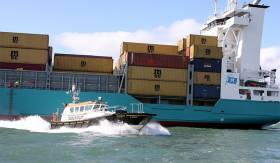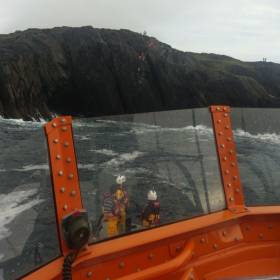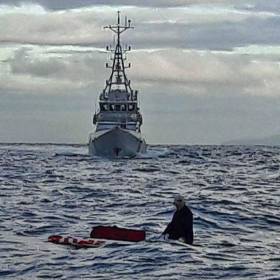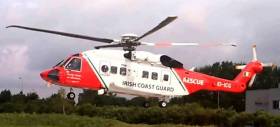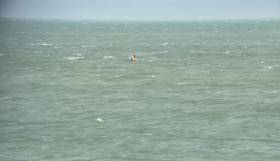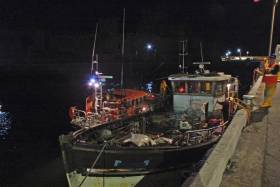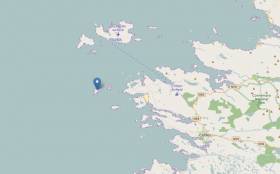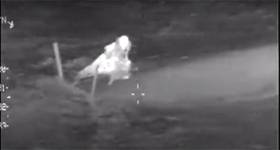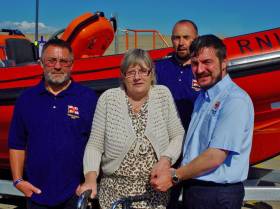Displaying items by tag: Rescue
Maritime Priorities In Transport’s Statement Of Strategy 2016-2019
#Maritime - ‘Safe and sustainable’ marine transport and ‘delivery of emergency management services’ have been made a high level goal in the Department of Transport, Tourism and Sport’s Statement of Strategy 2016-2019, published this week.
Identifying Ireland’s maritime sector as “a critical gateway” for trade and tourism, the statement calls for “an efficient and effective competitive ports sector [that] can foster job creation” via trade, infrastructure developments and “opportunities in other areas such as offshore energy, cruise and marine leisure and recreation.”
Reduced ship emissions and safety at sea are also priorities within the Maritime Safety Strategy, which “includes a range of actions to be implemented or begun by 2019” such as flag state and port state regimes, and the IMO’s Convention on Standards of Training, Certification and Watchkeeping for Seafarers.
Key services in this strategy include the delivery of a 24/7 marine emergency response and management service by co-ordinating the response to SAR incidents and pollution threats at sea.
Progress on these goals will be monitored by various indicators, such as the transfer of regional ports to local authority control by the end of 2018, the imposition of a new ‘ports performance’ measurement system by the end of 2017, the development of a web portal for SeaSafe Ireland by the middle of next year, as well as a minimum 90% availability of Irish Coast Guard units ahead of “full interoperability” of marine rescue co-ordination by next winter.
The full Statement of Strategy 2016-2019 can be downloaded HERE.
Castletownbere Lifeboat Joins Multi-Agency Rescue In Dursey Sound
#RNLI - Castletownbere RNLI’s lifeboat was tasked just before noon yesterday (Sunday 13 November) to go to the aid of a man trapped a ledge on the shore in the Dursey Sound.
The lifeboat, under the command of second coxswain Paul Stevens, was launched within seven minutes and arrived on scene 35 minutes later, where the casualty was located at the bottom of a cliff on a narrow ledge and suspected to be suffering from hypothermia.
Given the dangerous 3-4m swell on the shoreline, the lifeboat was unable to launch its inflatable Y-boat.
The Shannon-based Irish Coast Guard helicopter Rescue 115 was also on scene but unable to deploy a winchman given the adverse conditions.
However, the lifeboat was able to provide the coastguard with details of the casualty's location through radio contact.
The local Castletownbere Coast Guard shore-based rescue unit lowered one of its team down the rock face who was able to secure the casualty before both were carefully brought up the cliff.
On receiving a medical assessment from ambulance crew, the casualty was transferred to Tralee General Hospital by helicopter.
#Awards - Minister for Transport, Tourism and Sport Shane Ross presented the National Marine Gallantry and Meritorious Service Awards 2016 at a ceremony in Farmleigh House on Friday evening (14 October)
Minister Ross praised the “courageous achievements and service of this group of brave Irish men and women who have faced crises and dug deep, offering their skills and in many cases placing themselves in danger in order that others might be safe on our waterways.”
Pausing to remember those who lost their lives at sea since the previous awards in 2014, Minister Ross spoke of the tragic death of Irish Coast Guard volunteer Caitríona Lucas last month, describing her as “a courageous and heroic woman who made the ultimate sacrifice while in the service of others.”
Among this year’s recipients was Davitt Walsh, who in March rescued a four-month-old baby from the car that slipped into the water from Buncrana pier, claiming the lives of five members of the same family.
The 2016 award recipients are as follows:
- Davitt Walsh – Michael Heffernan Gold Medal for Marine Gallantry
- Gary Robertson – Michael Heffernan Gold Medal for Marine Gallantry
- Skerries Coast Guard Unit – Marine Ministerial Letter of Appreciation for Meritorious Service
- Dean Coleman – Marine Ministerial Letter of Appreciation for Meritorious Service
- Gavin Byrne – Marine Ministerial Letter of Appreciation for Meritorious Service
- Brian Kehoe, Ruairí Nunn, Sam Nunn and Niall McGee – Michael Heffernan Bronze Medal for Marine Gallantry
- The crew of Castletownbere RNLI – Marine Ministerial Letter of Appreciation for Meritorious Service
- Charlie Hennigar – Michael Heffernan Bronze Medal for Marine Gallantry
- The crew of Rescue 116, Dublin Airport – Marine Ministerial Letter of Appreciation for Meritorious Service
- Richard Desay – Marine Meritorious Service Medal
- The officers and crew of Lough Swilly RNLI – Marine Ministerial Letter of Appreciation for Meritorious Service
- Dean Tracey and Paul Dolan – Michael Heffernan Bronze Medal for Marine Gallantry
- The crew of Kinsale RNLI – Marine Ministerial Letter of Appreciation for Meritorious Service
The awards are to recognise outstanding acts of courage, heroism, skill and initiative in the context of marine emergency incidents. The scheme also recognises exceptional dedication to duty in the execution of Ireland’s marine emergency response.
The Marine Gallantry award is presented in the form of a medal, called the Michael Heffernan Medal for Marine Gallantry in memory of an individual who lost his life during a marine incident a number of years ago. Three levels of medal may be awarded — gold, silver or bronze — based on the level of gallantry involved. The medal is awarded in gold, silver or bronze.
A second award, Marine Meritorious Service Medal, may be awarded where outstanding meritorious service has been provided to, or within the remit of, the Irish Coast Guard. The person must have demonstrated exceptional dedication to duty, coupled with skill and initiative, in the execution of the service being provided.
A Marine Ministerial Letter of Appreciation may be awarded for meritorious service where outstanding dedication to duty over a career of service can be demonstrated, or for an act of particular meritorious dedication, showing skill and initiative, but which is not of an order for receipt of a Meritorious Service or Marine Gallantry medal.
The National Marine Gallantry and Meritorious Service Awards Committee is chaired by Bryan Dobson of RTÉ. Members of the committee include representatives of the Irish Sailing Association; Irish Water Safety; Irish Harbour Masters Association; Bord Iascaigh Mhara; Department of Transport, Tourism and Sport; as well as other independent members.
The first award ceremony took place in February 1999 and the awards ceremony was last held on 23 October 2014.
Man Rescued From Paddleboard In English Channel
#Rescue - A German national clad in only shorts, a fleece and a hat was rescued from the English Channel seven miles off the British coast on Sunday morning (9 October).
But according to BreakingNews.ie, there have been conflicting reports as to how the stand-up paddleboarder wound up in his predicament, following his discovery by a diving team off Dover at first light.
First indications that the tourist had set off from France the night before to cross to the UK had been met with scepticism by one of the divers who first approached him.
“His claim was that he’d left [France] at midnight and had managed to paddle something like 14 odd miles in seven hours. It’s a bit odd,” diver Chris Webb told The Independent.
However, the Dover Marina Facebook page now says the paddler has been identified as Alexander Hahn, so set off a number of weeks ago from Coburg following the waterways of Germany and France towards Britain.
Successful Long-Range Medevac By Sligo Coastguard Helicopter
#Coastguard - Early this morning the Sligo-based Irish Coast Guard helicopter completed the medical evacuation of an injured crewman from a large tanker some 350km off Eagle Island in Co Mayo.
The overnight operation was jointly co-ordinated with the UK Coastguard who had initially been alerted by the tanker, which is on a transatlantic voyage to the Orkney Islands.
Weather conditions on scene were described as reasonable with northwesterly winds of up to 40km per hour.
The injured crewman was airlifted by Rescue 118 shortly before 8am, and the helicopter was due back in Sligo before 10.30am for transfer of the casualty to Sligo University Hospital.
Howth Rescue Teams Launch To Lone Kayaker
#Rescue - Howth’s coastguard and lifeboat teams launched to the rescue of a lone kayaker off the North Dublin headland yesterday morning (Wednesday 28 September).
After a concerned onlooker called 999 when spotting that the kayaker was on the water with no life jacket, Howth Coast Guard and Howth RNLI’s inshore lifeboat were both tasked to the scene near Ireland’s Eye.
In the meantime the kayaker had proceeded around the back of the island and out of visibility from the caller on land. While the kayaker didn’t appear in difficulty, there were concerns for their safety.
A coastguard mobile unit proceeded to the end of the pier while the lifeboat launched on service to the far side of Ireland’s Eye, where the crew located a female on an open-deck kayak struggling in the water. She was brought back ashore by the lifeboat without incident.
“If she fell in the water, she had no means of staying afloat as she had no life jacket and only had a phone to call for help, there can be very limited if any phone signal once you go on the water,” according to an Irish Coast Guard spokesperson.
“The kayaker hadn’t checked the weather, which was unsuitable for the craft she was in. The lessons learnt are you need to have an emergency plan if going on the water – VHF radio, flares, whistle, weather information.
“Equally if not more important, you need a life jacket, no excuse.”
The rescue came just hours after Larne RNLI launched to assist two kayakers in difficulty off the Co Antrim coast, as previously reported on Afloat.ie.
Dramatic Rescue Of NI Trawler In Irish Sea Off Isle Of Man
#RNLI - Two British naval war ships, three helicopters and a fishing vessel joined Peel RNLI in the dramatic rescue of a trawler between Northern Ireland and the Isle of Man in the early hours of Wednesday morning (21 September).
The 20m converted fishing vessel from Kilkeel in Co Down was on passage in the Irish Sea from Glasgow to Conwy in Wales when it started taking water through the stern tube and was in danger of sinking some 11 miles west of the Isle of Man.
Peel's all-weather lifeboat Ruby Clery, under the command of coxswain Paul Cain, launched shortly after the volunteer crew were alerted at 1.30am.
Northern Irish fishing vessel Stephanie M gave shelter to the casualty until the lifeboat crew were able to put a pump on board to evacuate the water.
The vessel, with three adults and one child on board, was soon stabilised and helicopters and other vessels stood down. The trawler was then taken in tow by the lifeboat bound for Peel.
During this time, a young woman and the child were taken ill, so the tow was dropped about 15 minutes from Peel and the two taken to a waiting ambulance where they were treated and then removed to Nobles Hospital.
Meanwhile, the lifeboat returned to the stricken vessel, which was now under its own power, and escorted it into Peel Harbour at about 5am.
"We advise people to always check their equipment before leaving port," said Cain after the callout.
Clifden Man Treated For Hypothermia After Boat Sinks Off Connemara
#Rescue - Galway Bay FM reports that a man was recovering from hypothermia last night (Tuesday 13 September) after his boat sank off Connemara.
The man had set out from Clifden earlier in the day headed for Ardoileán, or High Island, off northwest Connemara, when the transom securing the engine to his vessel fell off.
Visitors walking near Cleggan heard his cries for help when he managed to swim the shore, and he was later transferred to hospital in Castlebar for treatment.
Rescued Yachtsman Repeats Tribute To Coastguard Saviours After Irish Sea Ordeal
#Rescue - The French sailor rescued from the hull of his upturned yacht off the Wexford coast this summer has again paid tribute to the Irish Coast Guard crew who came to his aid.
As previously reported on Afloat.ie, yachtsman Jean Conchaudron was plucked from the sea after keel failure led to him capsizing en route from Cornwall to Dublin on the night of Tuesday 26 July.
Quick-thinking Conchaudron activated his personal locator beacon, or PLB, after scrambling out of the water onto the upturned hull.
That action immediately notified the UK coastguard, who alerted their Dublin-based counterparts who in turn sent the Wexford-based SAR helicopter Rescue 117 to his location.
It was winchman Adrian O'Hara who was the first to greet Conchaudron as he lifted him from the boat to safety, as the Irish Mirror reports.
And the experienced French solo sailor said it was literally a matter of life and death before O'Hara and his fellow Rescue 117 crew arrived.
“Thank you my friend! These are my first words, the only words that come to me," he said. "I have a friend, a true friend, someone who is ready to risk his life and those of his friends, every day for an ordinary guy like me.”
In other coastguard news, TheJournal.ie has an in-depth feature following a day in the life of Rescue 117's chief pilot Mark McDermott, who joined the Waterford-based crew after retiring fro the Royal Navy in 2005.
“Every job we do is challenging in a different way,” he says. "We could be on a mountain rescue, managing an effective hover in massive up and down drafts, or we could be out to sea evacuating a cardiac patient from a boat and getting them to hospital, or we could be carrying a child with meningitis to hospital.
"You never know what you’ll be doing."
Ballyholme Beach Faller Thanks Bangor Lifeboat Crew For Her Rescue
#RNLI - Geraldine Donnelly paid a visit to Bangor RNLI earlier today (Thursday 25 August) just weeks after her rescue following a serious fall on Ballyholme beach.
On 7 June last, Donnelly fell more than two metres onto rocks and shingle from Ballyholme Esplanade after one of her two dogs pulled its leash and over-balanced her, as previously reported on Afloat.ie.
After five weeks in the Ulster Hospital and another four receiving physiotherapy, Donnelly is now back on her feet, although full recovery could be a year away.
Today she met three of the lifeboat crew involved in her rescue – helm Mickey McKenna, John Bell and Richard McClinton. A fourth crew member, Ian Browne, sent his regards as he is currently working overseas.
"As soon as I fell, I knew it was serious, and if it wasn’t for the RNLI, I really don’t think I’d be alive today," she said today as she praised the Bangor RNLI crew for their actions, in particular "her angel" John Bell, who held her hand throughout her ordeal.
"Every day since the accident, I’ve wanted to thank you for your kind words and for holding my hand," she said. "It made such a difference, and kept me calm; something the doctors say prevented the injury being even worse."



























